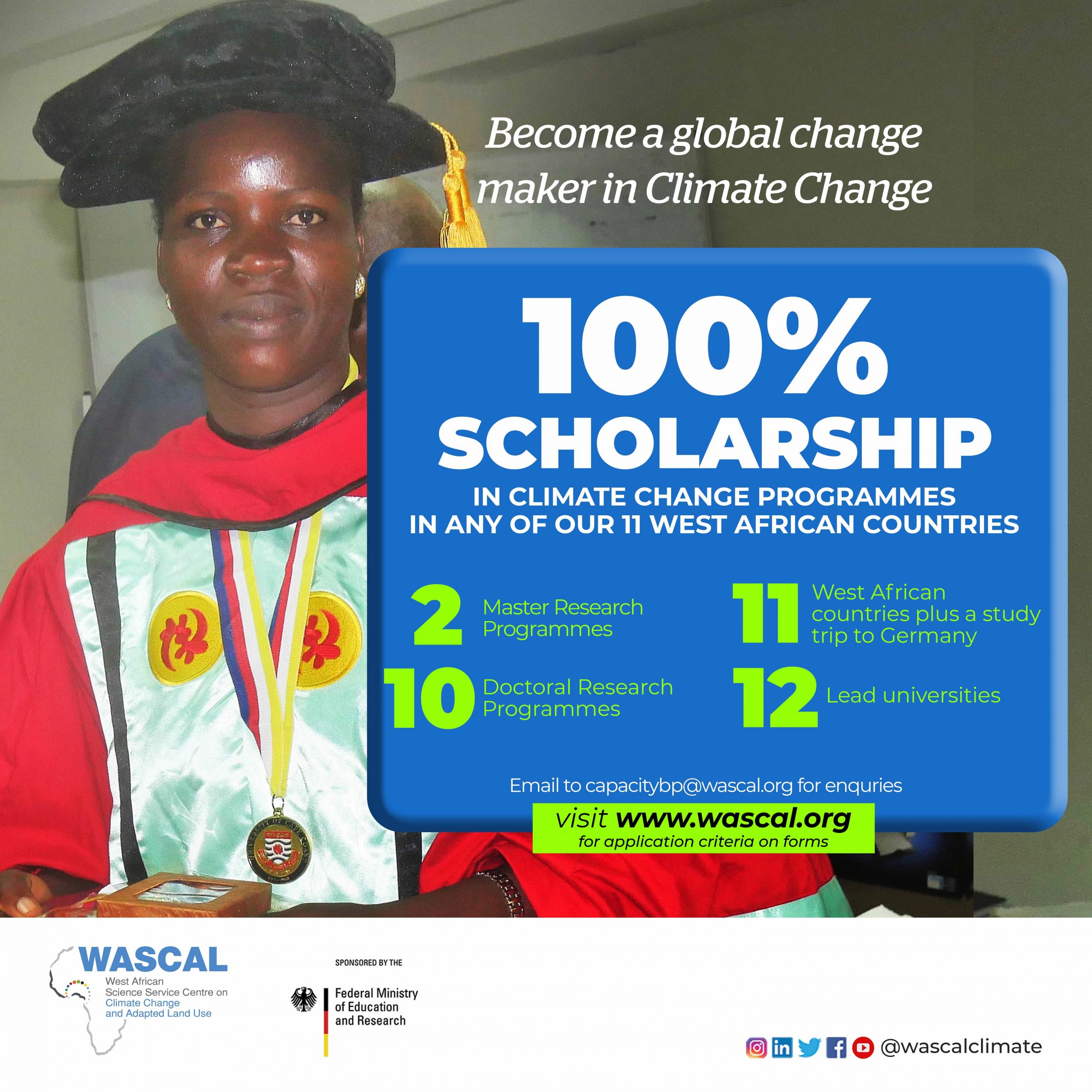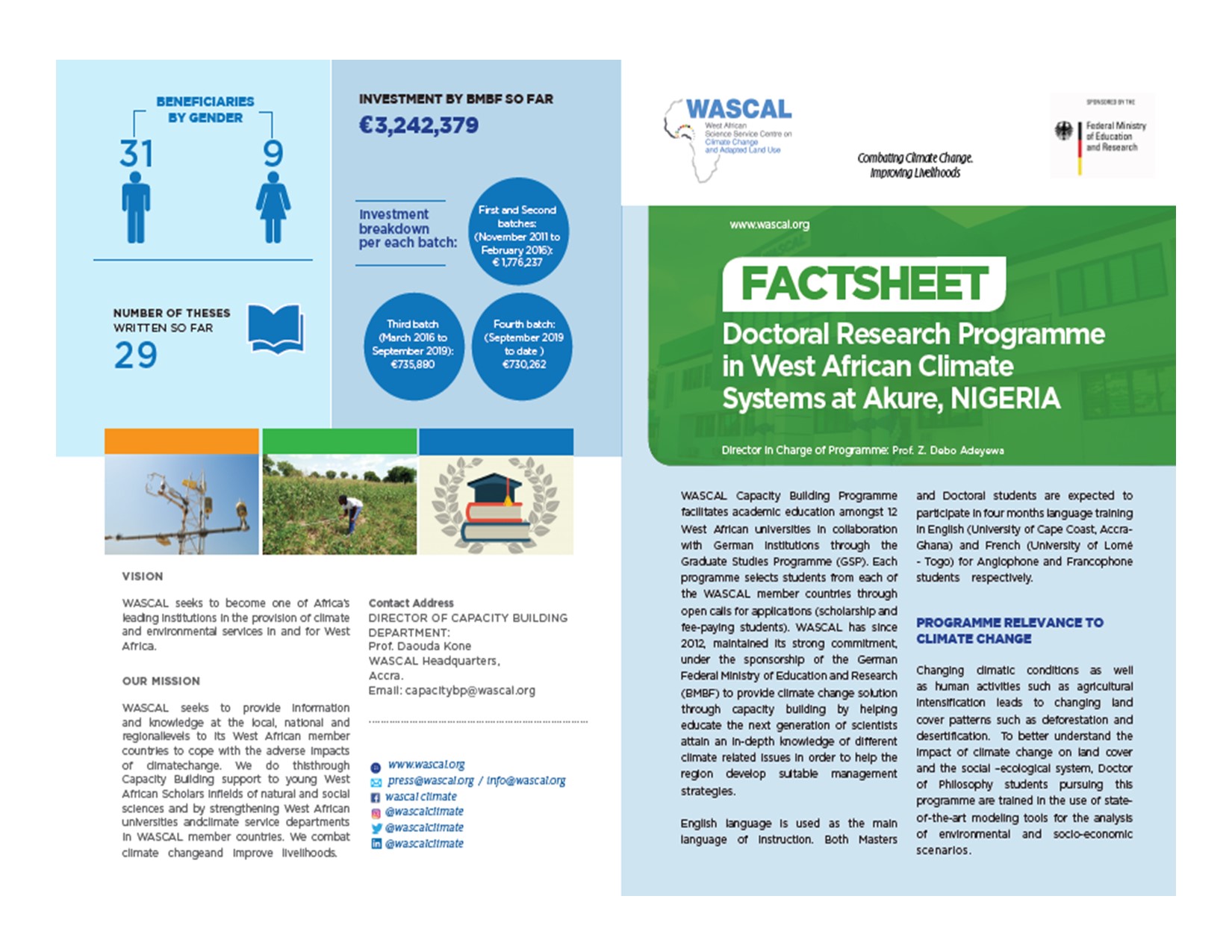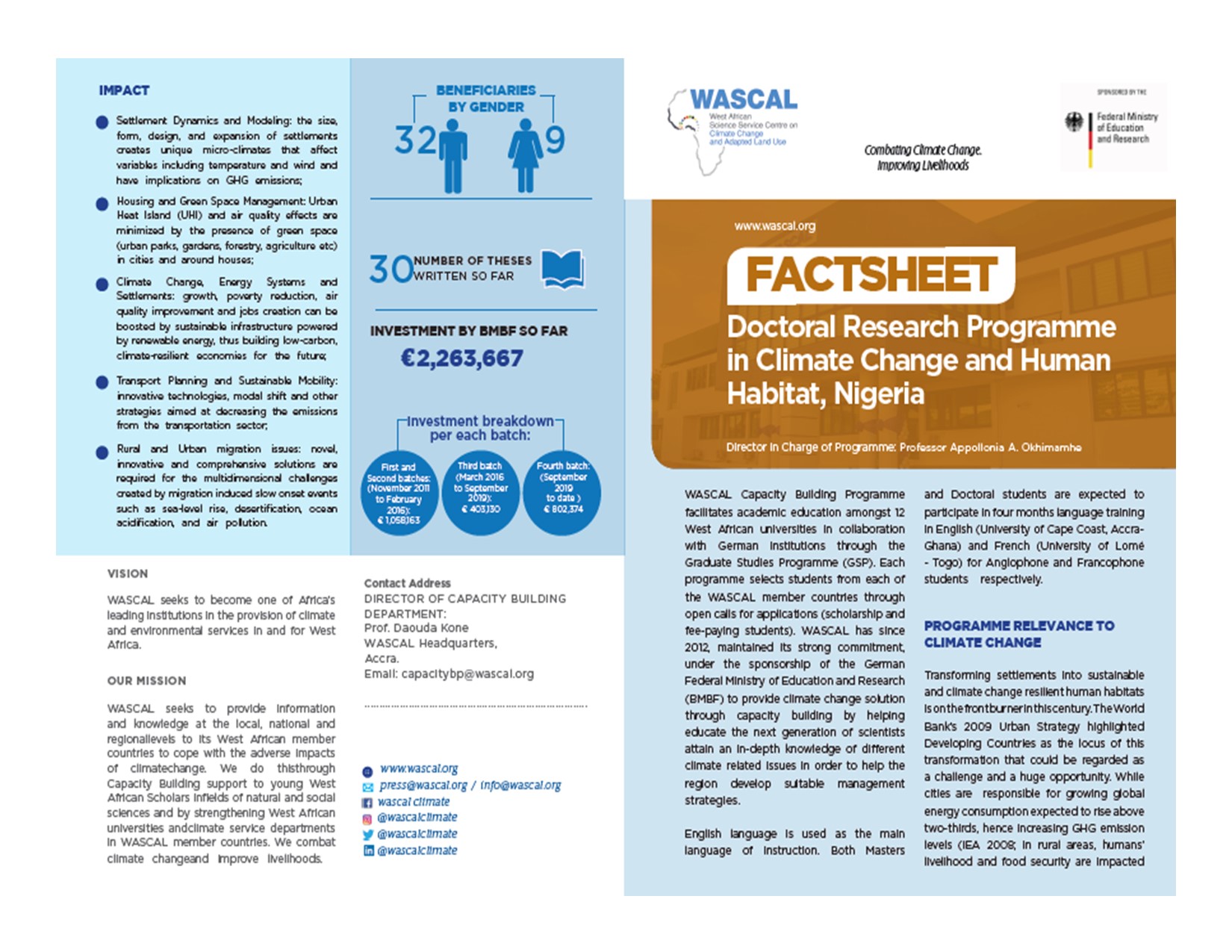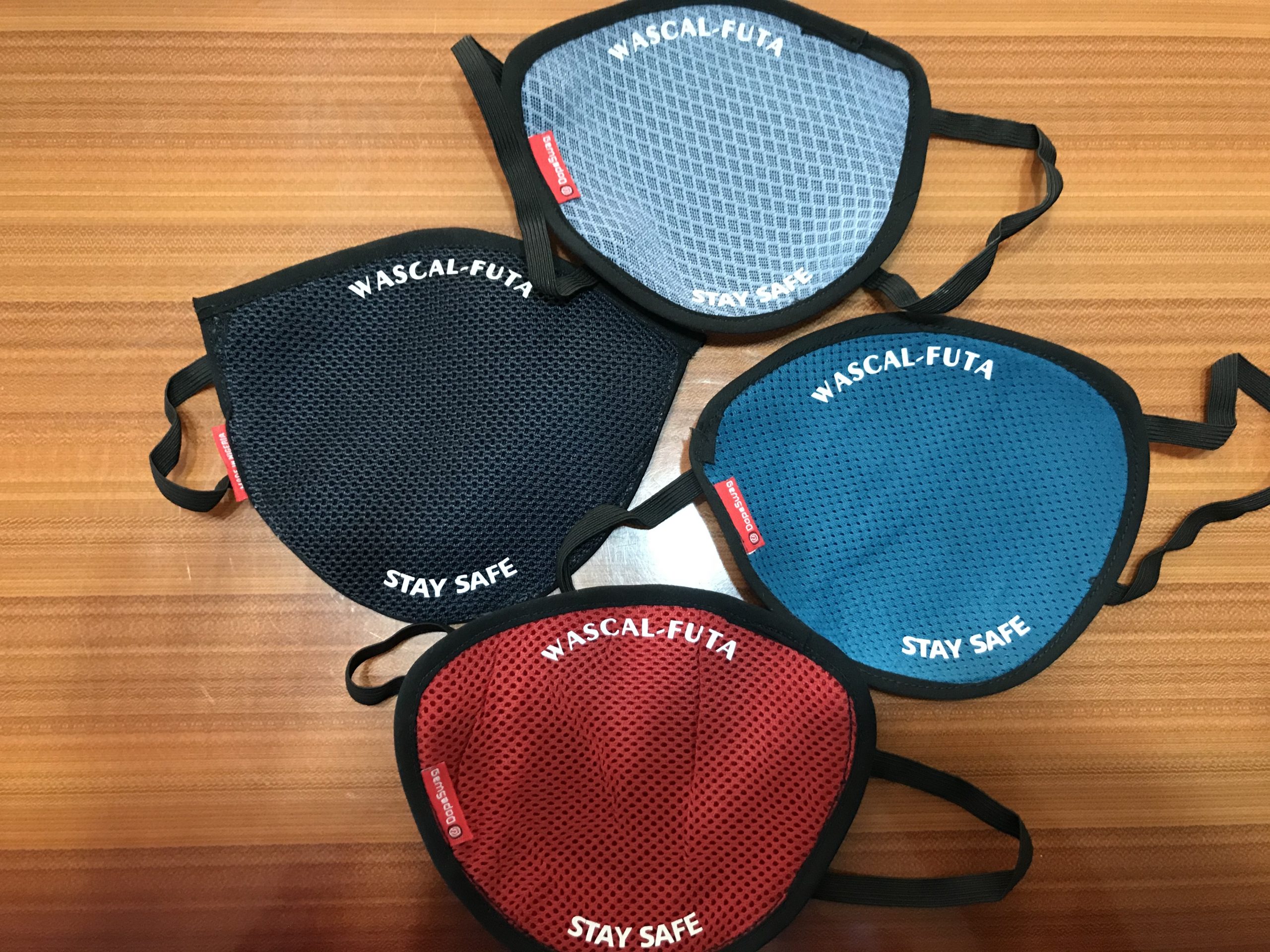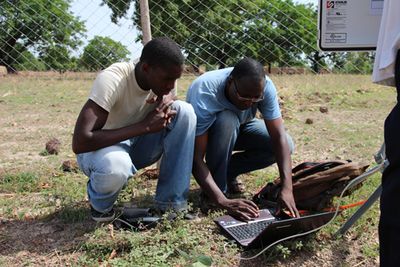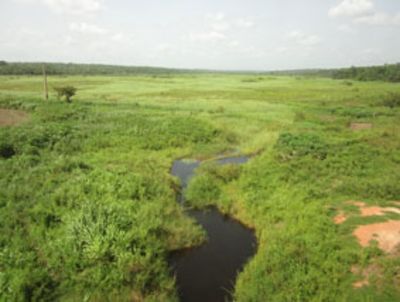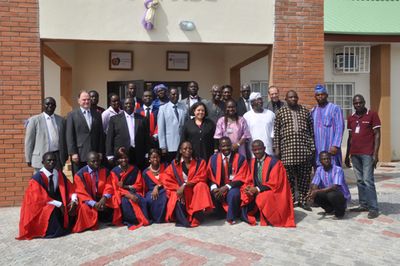A delegation from the German Ministry of Education and Research (BMBF) led by the Head of Unit, Global Change and Climate Research, BMBF, Dr. Karsten Hess has paid a working Continue Reading
WASCAL and delegates from the German Federal Ministry of Education and Research (BMBF) have participated in this years’ ECOWAS Sustainable Energy Forum (ESEF), which took place in Abuja, Nigeria, under Continue Reading
Download the Application Form Below Application Form – Master Research Program on Informatics for Climate Change Université Joseph KI-ZERBO, Ouagadougou Download the Application Form Below Application Form – PhD in Continue Reading
DOWNLOAD LINK https://wascal.org/wp-content/uploads/2021/02/print-futa-1.pdf
DOWNLOAD LINK https://wascal.org/wp-content/uploads/2021/02/FACTSHEET-CLIMATE-CHANGE-AND-HUMAN-HABITAT-NIGERIA-FUTMINNA.pdf
As part of efforts to fight the global pandemic corona virus, members of staff of the Doctoral Research Programme-West African Climate Systems (WACS -FUTA) have donated 50 packs of COVID-19 Continue Reading
The two-day meeting was attended by representatives from four West African countries – The Gambia, Liberia, Nigeria and Ghana.
“In West Africa we have a population of about 348 million and looking at what WASCAL has done so far, producing about 200 research scientists, our projection is to have about 3,000 climate scientists
“In West Africa we have a population of about 348 million and looking at what WASCAL has done so far, producing about 200 research scientists, our projection is to have about 3,000 climate scientists by the year 2020,”
The West Africa Science Service Centre on Climate Change and Adapted Land Use (WASCAL) is to train about 3,000 research scientists by the year 2020.
This is intended to contribute to efforts by member countries of WASCAL to fight the effects of climate change on the West African sub-region and also improve the resilience of West African countries to climate change and climate variability.
The Director, Capacity Building, WASCAL, Professor Janet Olatundun Adelegan, gave the hint yesterday, when she presented a brief on WASCAL’s capacity-building programme, during the opening ceremony of a sub-regional consultative meeting on climate change in Accra.
Ghana News Headlines
For today’s latest Ghana news, visit Graphic Online headlines page Ghana news headlines.
The two-day meeting was attended by representatives from four West African countries – The Gambia, Liberia, Nigeria and Ghana.
“In West Africa we have a population of about 348 million and looking at what WASCAL has done so far, producing about 200 research scientists, our projection is to have about 3,000 climate scientists by the year 2020,” Prof. Adelegan said.
She explained that the centre was expected to organise short courses and workshops to complement the major courses which would be demand-driven and focused on the priorities of countries in the sub-region, so as to make them relevant.
Essence of meeting
The Executive Director of WASCAL, Dr Laurent G. Sedogo, said the meeting was the last of three sub-regional consultative meetings that were “aimed at identifying common research and capacity building needs of different member countries for consideration in a final regional meeting in a few months” in Ouagadougou.
He said WASCAL had commissioned national and regional consultative meetings and had so far held 14 of such , to solicit the inputs of partners and customers for their research agenda for 2017 to 2020.
“Our overarching objective is to integrate, as much as possible, the research and capacity-building needs expressed by our partners into our research agenda, so as to make our research findings and the climate services relevant to the needs of the ECOWAS region,” he stated.
Sense of ownership
The Deputy Head of Mission and Head of the Economic Section of the German Embassy, Mr Bernhard Abels, who was the special guest of honour, said the Federal Ministry of Education and Research (BMBF) and Germany wished that through the consultative workshops, member countries would develop a high sense of ownership of the WASCAL programme and agenda.
He said the BMBF also hoped that African countries would increasingly commit human and financial resources to achieve the ultimate goal of significantly reducing the effects of climate change and climate variability on human and environmental systems.
Citing some of the effects of climate change on the West African sub-region, Mr Abels said, “As the main source of livelihood for majority of the populace, rain-fed agriculture is becoming unattractive and unbeneficial for millions of smallholder farmers due to factors such as delayed start of rains, long spells during the season and declining soil fertility.”
He indicated that it was to reduce the impact of climate change that over €30 million had already been invested in infrastructure, scientific equipment, capacity building and research by German and African scientists in the last five years.
Please note: The call for application has been extended to January 22, 2016.
WASCAL (West African Science Service Center on Climate Change and Adapted Land Use) is a large-scale research-focused Climate Service Center designed to help tackle severe challenges posed by climate change and thereby enhance the resilience of human and environmental systems to climate change and increased variability. It does so by strengthening the research infrastructure and capacity in West Africa related to climate change and by pooling the expertise of ten West African countries and Germany. Through the Graduate Studies Program WASCAL’s Capacity Building Program helps educate the next generation of scientists to attain an intimate knowledge of different climate related issues in order to help the region develop suitable management strategies.
The WASCAL Graduate Studies Program supports four Master’s and six Doctoral Programs implemented at ten lead Universities across West African countries. WASCAL provides full scholarships to the Doctoral and Master’s students in all the ten lead Universities with comprehensive training and research support. Doctoral students may spend up to six months at a host institution in Germany. The language of instruction is English. English and French language training programs are provided for all graduate students. Graduate students have access to the research facilities set up through WASCAL funding and located at various watersheds in West Africa. German partner universities collaborate with the Doctoral and Master’s Programs in the areas of curriculum development, visiting professorships and co-supervision of graduate students.
The WASCAL Graduate Studies Program offers its students:
High quality research and education on climate change and its impact on human environmental systems.
Up to six months at a host institution in Germany (Doctoral Programs only!)
Interdisciplinary working approach
International lecturers and supervisors
English language classes
Scholarship and research budget, including a personal laptop computer
Doctoral Programs
West African Climate System
Federal University of Technology, Akure (FUTA), Nigeria
Apply now: Download call for applications and application form and the recommendation letter
Climate Change and Water Resources
Université d’Abomey-Calavi (UAC), Benin
Apply now: Download call for applications and application form
Climate Change Economics
Université Cheikh Anta Diop de Dakar (UCAD), Senegal
Apply now: Download call for applications and application form
Climate Change and Biodiversity
Université Felix Houphouet Boigny (formerly Université de Cocody‐Abidjan), Côte d‘Ivoire
Apply now: Download call for applications and application form
Climate Change and Land Use
Kwame Nkrumah University of Science and Technology (KNUST), Ghana
Apply now: Download call for applications and referee form and application form
Climate Change and Agriculture
L’Institut Polytechnique Rural de Formation et de Recherche Appliquée, (IPR-IFRA), Mali and University of Cape Coast, Ghana
Apply now: Download call for applications and application form
Time Frame
The time frame of the doctoral programs is three and a half years. During the first three months, students take English and/or French language classes and common courses at the language centers. During the next 6 months student participate in lectures at their Graduate Research Program and prepare their proposals. After their proposals have been approved by their supervisors, the students conduct their field research for 12 to 24 months. For the remaining period of time, students will write up their thesis and are offered to spend up to six months at a German host institution.
Requirements
Candidates applying for a Doctoral Program must have a Master’s degree in a relevant discipline in addition to a BSc degree (second class upper division).
Citizenship in one of the WASCAL member country (Bénin, Burkina Faso, Côte d’Ivoire, The Gambia, Ghana, Niger, Mali, Nigeria, Sénegal, Togo)
Five credits including Mathematics and English Language that are also equivalent to Francophone university grading system
Gender-balanced selection decision
Applicant should show proficiency in English Language.
Meet additional requirement of the lead university
Master’s Programs
Climate Change and Human Security
University of Lomé, Togo
Apply now: Download call for applications and application form
Climate Change and Education
University of The Gambia (UTG), The Gambia
Apply now: Download application form
Climate Change and Energy
Université Abdou Moumouni de Niamey (UAM), Niger
Apply now: Download call for applications and application form
Climate Change and Adapted Land Use
Federal University of Technology, Minna, Nigeria
Apply now: Download application form
Time Frame
The time frame for the Master’s programs is two years. During the first year students participate in the course program of their Graduate Research Program and work on their research outline. Research will be conducted during the second year within a period of six to nine months. Students finish the program with writing up their thesis during the last three to six month.
Requirements
Candidates applying for Master’s Program must have a minimum BSc degree (second class upper division) in a discipline relevant to the respective program.
Citizenship in one of the WASCAL member country (Bénin, Burkina Faso, Côte d’Ivoire, The Gambia, Ghana, Niger, Mali, Nigeria, Sénegal, Togo)
Five credits including Mathematics and English Language that are also equivalent to Francophone university grading system
Gender-balanced selection decision
Applicant should show proficiency in English Language.
Meet additional requirement of the lead university
Application Process
The application process is handled jointly by WASCAL and the individual Graduate Programs. Applications can be submitted online to any of the Graduate Studies Program for the 2015/2015 season until January 22, 2016. The details of the application process can be found at the respective programs pages (see linkes above). Shortlisted candidates will be contacted and invited for interviews by January 29, 2016.
More information on the Graduate Studies Program and on open applications can be found here or at the respective universities websites.
Update: The deadline has been postponed to february 29, 2016
Applicants must have completed all course requirements for the degree as well as be in the research and/or writing phase of the dissertation. The dissertation must be on climate change and any of the thematic areas of biodiversity, agriculture, adapted land use, climate systems, education, human security, economics and energy. In addition, applicants should not have received any other funding to support the dissertation activities outlined in the PhD or MSc proposal/budget. Priority is given to candidates pursuing a career in government ministries, research and/or teaching at a public institution in West Africa.
Requests should be supported by the following documentation:
Evidence of an attachment to, or sponsorship by, an institution in West Africa engaged in government ministries, research and/or training in the public sector in the region.
Evidence of registration in a recognized PhD or MSc program in a relevant area.
An approved research proposal, complete with clearly defined objectives, substantial literature review and a well-outlined analytical framework, as well as pertinent research methodology.
A statement of limitations and policy relevance of the study.
A letter of reference from the thesis supervisor, and a letter of institutional support from the Head of Department.
A detailed budget including evidence of any additional financial support that may be necessary to complete the program.
Curriculum vitae.
Processing of Application for PhD Thesis Research Award
Upon the receipt of the proposal and the supporting documentation, it is sent to two external reviewers in the relevant programs of the WASCAL Graduate Studies Program, who comment on the adequacy of the proposal. In the event that the reviewers suggest corrections to be made and give positive feedback, the comments are sent to the students to incorporate and then resubmit the revised proposal for a final review. Once the proposal is cleared by at least two reviewers, it is presented together with the comments from the external reviewers to the Thesis Grant Sub-Committee of the Graduate Studies Program, who will go through the recommendations of the reviewers and make recommendation to the Capacity Building Department of WASCAL to approve for thesis funding. It is after this that research grants can be awarded.
Application Deadlines for 2015/2016 Academic Session
The PhD and MSc Thesis Research Awards applications deadline is January 30, February 29, 2016.
Proposal and supporting documents for thesis grant should be sent to:
The Director of Capacity Building,
WASCAL Accra Office, CSIR Office Complex,
Agostino Neto Road, Airport Residential Area, PMB CT 504, Cantonments-Accra.
Email: intern.w(at)wascal.org; weto.s(at)wascal.org
Note: The call for application has been extended to January 22, 2016. Read more
WASCAL (West African Science Service Center on Climate Change and Adapted Land Use) is a large-scale research-focused Climate Service Center designed to help tackle severe challenges posed by climate change and thereby enhance the resilience of human and environmental systems to climate change and increased variability. It does so by strengthening the research infrastructure and capacity in West Africa related to climate change and by pooling the expertise of ten West African countries and Germany. Through the Graduate Studies Program WASCAL’s Capacity Building Program helps educate the next generation of scientists to attain an intimate knowledge of different climate related issues in order to help the region develop suitable management strategies.
The WASCAL Graduate Studies Program supports four Master’s and six Doctoral Programs implemented at ten lead Universities across West African countries. WASCAL provides full scholarships to the Doctoral and Master’s students in all the ten lead Universities with comprehensive training and research support. Doctoral students may spend up to six months at a host institution in Germany. The language of instruction is English. English and French language training programs are provided for all graduate students. Graduate students have access to the research facilities set up through WASCAL funding and located at various watersheds in West Africa. German partner universities collaborate with the Doctoral and Master’s Programs in the areas of curriculum development, visiting professorships and co-supervision of graduate students.
The WASCAL Graduate Studies Program offers its students:
High quality research and education on climate change and its impact on human environmental systems.
Up to six months at a host institution in Germany (Doctoral Programs only!)
Interdisciplinary working approach
International lecturers and supervisors
English language classes
Scholarship and research budget, including a personal laptop computer
Doctoral Programs
West African Climate System
Federal University of Technology, Akure (FUTA), Nigeria
Apply now: Download call for applications and application form and the recommendation letter
Climate Change and Water Resources
Université d’Abomey-Calavi (UAC), Benin
Apply now: Download call for applications and application form
Climate Change Economics
Université Cheikh Anta Diop de Dakar (UCAD), Senegal
Apply now: Download call for applications and application form
Climate Change and Biodiversity
Université Felix Houphouet Boigny (formerly Université de Cocody‐Abidjan), Côte d‘Ivoire
Apply now: Download call for applications and application form
Climate Change and Land Use
Kwame Nkrumah University of Science and Technology (KNUST), Ghana
Apply now: Download call for applications and referee form and application form
Climate Change and Agriculture
L’Institut Polytechnique Rural de Formation et de Recherche Appliquée, (IPR-IFRA), Mali and University of Cape Coast, Ghana
Apply now: Download call for applications and application form
Time Frame
The time frame of the doctoral programs is three and a half years. During the first three months, students take English and/or French language classes and common courses at the language centers. During the next 6 months student participate in lectures at their Graduate Research Program and prepare their proposals. After their proposals have been approved by their supervisors, the students conduct their field research for 12 to 24 months. For the remaining period of time, students will write up their thesis and are offered to spend up to six months at a German host institution.
Requirements
Candidates applying for a Doctoral Program must have a Master’s degree in a relevant discipline in addition to a BSc degree (second class upper division).
Citizenship in one of the WASCAL member country (Bénin, Burkina Faso, Côte d’Ivoire, The Gambia, Ghana, Niger, Mali, Nigeria, Sénegal, Togo)
Five credits including Mathematics and English Language that are also equivalent to Francophone university grading system
Gender-balanced selection decision
Applicant should show proficiency in English Language.
Meet additional requirement of the lead university
Master’s Programs
Climate Change and Human Security
University of Lomé, Togo
Apply now: Download call for applications and application form
Climate Change and Education
University of The Gambia (UTG), The Gambia
Apply now: Download application form
Climate Change and Energy
Université Abdou Moumouni de Niamey (UAM), Niger
Apply now: Download call for applications and application form
Climate Change and Adapted Land Use
Federal University of Technology, Minna, Nigeria
Apply now: Download application form
Time Frame
The time frame for the Master’s programs is two years. During the first year students participate in the course program of their Graduate Research Program and work on their research outline. Research will be conducted during the second year within a period of six to nine months. Students finish the program with writing up their thesis during the last three to six month.
Requirements
Candidates applying for Master’s Program must have a minimum BSc degree (second class upper division) in a discipline relevant to the respective program.
Citizenship in one of the WASCAL member country (Bénin, Burkina Faso, Côte d’Ivoire, The Gambia, Ghana, Niger, Mali, Nigeria, Sénegal, Togo)
Five credits including Mathematics and English Language that are also equivalent to Francophone university grading system
Gender-balanced selection decision
Applicant should show proficiency in English Language.
Meet additional requirement of the lead university
Application Process
Note: The call for application has been extended to January 22, 2016. Read more
The application process is handled jointly by WASCAL and the individual Graduate Programs. Applications can be submitted online to any of the Graduate Studies Program for the 2015/2015 season until January 8, 2016. The details of the application process can be found at the respective programs pages (see linkes above). Shortlisted candidates will be contacted and invited for interviews by January 15, 2016.
More information on the Graduate Studies Program and on open applications can be found here or at the respective universities websites.
Organized by the Centre for Continuing Education, the WASCAL Graduate Research Program West African Climate System (GRP-WACS) and the Department of Meteorology & Climate Science of the Federal University of Technology Akure (FUTA), the workshop was held from September 14-18, 2015 at the Federal University of Technology, Akure.
The main target of the workshop was contributing to a better understanding of the causes and consequences of climate change among policy- and decision-makers. The program provided training on, among others, projections, variability and weather extremes, challenges, risks and opportunities related to climate change, adaptation, policy and governance as well as climate change policy design and response.
Professor Jerome Omotosho, Director of GRP-WACS, highlighted in his opening speech that the workshop was to provide adequate information and raise the understanding of climate change among stakeholders and most importantly facilitate discussion on which measures could be taken to put this knowledge into practice.
This is the first of a series of workshops planned in the next 9 months, by the three Departments of GRP-WASC and FUTA, on various aspects of climate change and weather. The next workshop is planned to be organized in collaboration with the WASCAL Master Program Climate Change and Adapted Land Use, Federal University of Technology, Minna and to thus expand the stakeholder reach.
Media Coverage:
FUTA workshop examines climate change causes, consequences, EnviroNews Nigeria, September 16, 2015.
Why we organised climate change information workshop- WASCAL chief, Newswatch Times, September 23, 2015
Thirteenth (13th) October 2014 will remain a ‘memorable day’ in the history of WASCAL CC & ALU hosted by the Federal University of Technology, Minna. The MRP scored a big first in the WASCAL programme….sending forth the first set of WASCAL graduates into the research community to give back to the world after the huge investment on them as scientists. Two years of hard work finally paid off.
Our August dignitaries graced the occasion. Prof Musbau A. Akanji (the Vice Chancellor of the Federal University of Technology, Minna) and his team of Principal Officers received the guests which comprised the Honorable Minister of Environment of Nigeria, who was very unavoidably absent but ably represented by Dr Jare Adejuwon, the Director of Climate Change Department in the Ministry; the German Ambassador to Nigeria who was ably represented by Mr Dirk Schulz; Chairman of WASCAL Board (Prof Haidara), WASCAL Board member representing Nigeria and Second Vice Chairman (Prof Osuntogun); Executive Director and his team (Dr Sedogo, Ouattara and Mr Ofori); The Vice Chancellor of FUTA ably represented by Prof Bayo Omotosho; representatives of our two German Partner Universities (Dr Thiel and Mrs Boutros, who is also the GRP/MRP Coordinator of WASCAL); members of WASCAL CC&ALU International Regional Advisory Board comprising Prof Bayo Omotosho (Director WACS FUTA), Dr Eric Forkuo (representing KNUST), Dr Georges Abbey (representing University of Lome), Mrs Christine K (from HBF representing the Civil Society), Dr Jare Adejuwon (representing Focal Ministry); members of FUT Minna Advisory Board led by the Dean of Postgraduate School, Prof (Mrs) Stella Zubairu; staff and students of WASCAL and representatives of the Press.
The ‘big day’ tagged WASCAL DAY commenced with the ceremony marking the graduation of the 2012/2013 Batch of WASCAL CC &ALU students. While the sponsoring Ministry in Germany, BMBF was showered with gratitude for the foresight demonstrated through the WASCAL programme, congratulatory and encouraging messages were passed on to the students to be worthy Ambassadors of WASCAL. The commitment of the Nigerian Government to the successful implementation of WASCAL was emphasized by the Honourable Minister’s representative. To add glamour to the occasion, the traditional dancers, Gwape Troupe, invited to entertain the guests decided to invite dignitaries to the ‘shake body’ to the entertaining music. From there, the newly completed WASCAL CC & ALU building was commissioned. The guests were introduced to WASCAL by the Director CC & ALU at the reception, while along the corridors of this simple but beautiful building, A0 Size posters were exhibited showcasing the students’ research. Each student stood beside his/her poster to explain the content to the guests. During the luncheon organized to round up activities for the day, three students were recognized and presented with personalized plaques: Mr SANOGO, Karamoko (Most improrved student); Miss KIMA, Sophie A. (Best Research); and Mr ADENLE, Ademola Andrew (The Overall Best Student). The 2012/2013 Batch of WASCAL CC & ALU graduates have since left for their various countries as the very first ALUMNI of the programme. The Director of CC&ALU gratefully acknowledges the contribution of the University Management, guests and WASCAL staff and students to the success of the WASCAL DAY in FUT Minna.
Read more on the event at http://www.futminna.edu.ng/index.php?option=com_content&view=article&id=1095&Itemid=
Contact
Dr. Appollonia Okhimamhe
Director of the Master Research Program Climate Change and Adapted Land Use
Associate Professor of Geography
Head, Department of Geography
Federal University of Technology,
Minna
PMB 65, Niger State, NIGERIA
Email: aimiosino(at)yahoo.com




